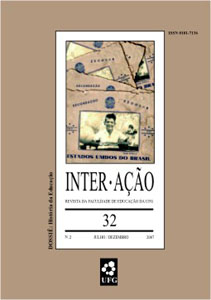A FORMAÇÃO DE PROFESSORES NO BRASIL EM NÍVEL SUPERIOR: PRIMEIRAS EXPERIÊNCIAS
DOI:
https://doi.org/10.5216/ia.v32i2.3059Abstract
O presente artigo busca analisar as primeiras experiências de formação superior do professor no país. Examina as propostas de formação do professor em nível superior, inclusive as do professor primário, debatidas e implementadas no período inicial de industrialização do país, de 1930 a 1946. Os debates em torno da preparação de docentes realizados nesse período estão marcados pelo contexto histórico e pelas disputas, entre educadores liberais e católicos, para a definição da política educacional do país. Os primeiros cursos instituídos no IE-USP (1934) e na UDF (1935), para a formação superior do professor em todos os níveis, propostos no Manifesto dos Pioneiros da Educação Nova de 1932, foram extintos com o advento do Estado Novo. Esse fato em muito condicionou a inserção da área da educação no interior da universidade brasileira.Downloads
Downloads
Published
How to Cite
Issue
Section
License
Inter-Ação uses the Creative Commons Attribution 4.0 License for Open Access Journals (Open Archives Initiative - OAI) as the basis for the transfer of rights. Open access means making documents available on the Internet free of charge, so that users can read, download, copy, distribute, print, search, or link to the full text of documents, process them for indexing, use them as input data for software programs, or use them for any other lawful purpose, without financial, legal, or technical barriers.
Authors publishing in this journal agree to the following conditions:
1) Authors retain copyright and grant the journal the right of first publication, with the work simultaneously licensed under the Creative Commons Attribution License, which permits redistribution of the work with attribution and first publication in this journal.
2) Authors are permitted to enter into additional, separate agreements for non-exclusive distribution of the version of the work published in this journal (e.g., for publication in an institutional repository or as a book chapter), with attribution and first publication in this journal.
3) Authors are permitted and encouraged to publish and distribute their work online (e.g. in institutional repositories or on their home page) at any time before or during the editorial process, as this may generate productive changes as well as increase the impact and citation of the published work.















